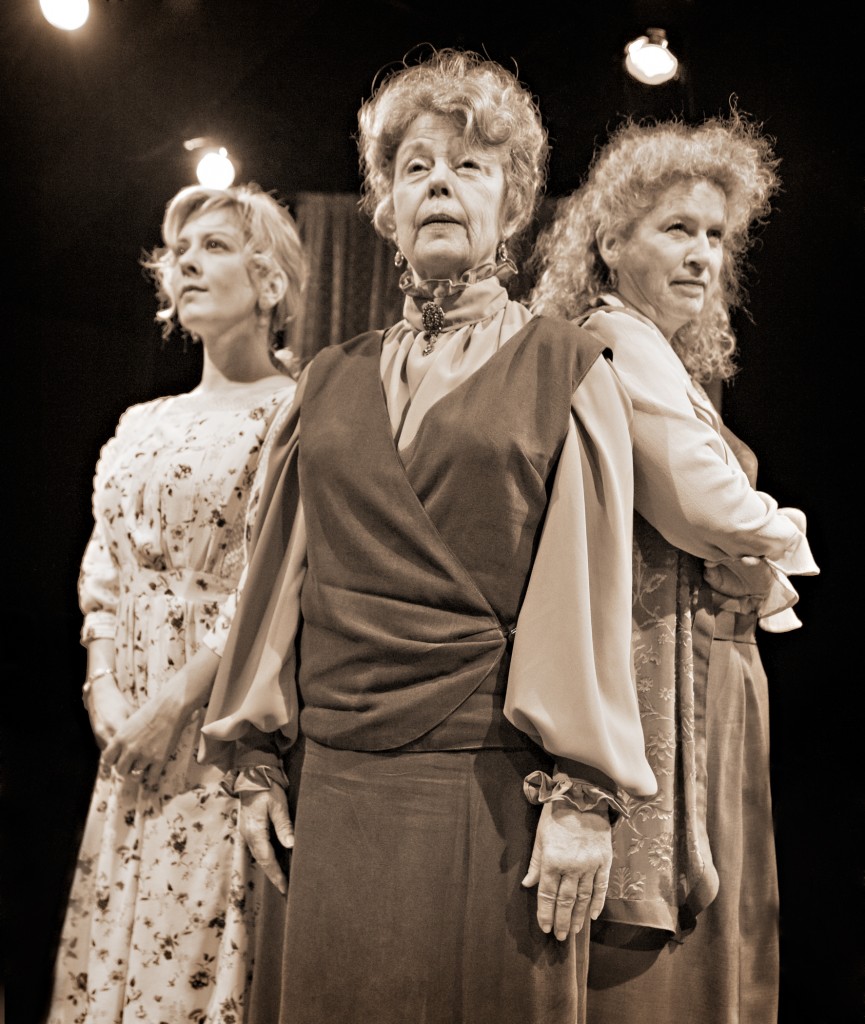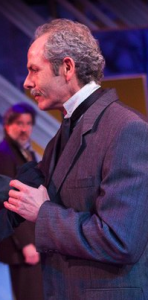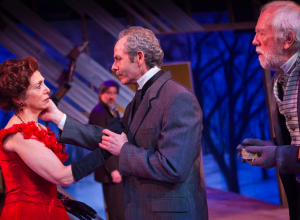
Here’s a story about the playwright Horton Foote, told by his daughter Daisy Foote and reprinted in the program for Profile Theatre‘s new production of his play The Carpetbagger’s Children, which opened Saturday night:
A few years ago a playwright friend and I were having dinner with my father. My friend had just seen “The Carpetbagger’s Children” at Lincoln Center Theater, and he casually asked my dad how long it took him to write the play. My father, even more casually, answered that it took him all of ten days. At that point, my friend looked like he might throw up all over the table and I might start crying, so my father took pity on us and added, “But I had been thinking about it for a very long time.”
Well, of course.
Stories take time — a lifetime, sometimes — and the actual setting down of them can be simply the culmination of a very long process, the plucking of the fruit from a tree that took years to mature and finally produce. It’s a little like the oft-told story of the “overnight success” that took twenty years to achieve.
But in Foote’s case (he died last March, 10 days shy of his 93rd birthday) it’s not just a matter of long experience bringing forth a story. It’s a matter of long experience in learning how flexible the theater can be, too. The Carpetbagger’s Children, for all its apparent traditionalism, breaks all sorts of rules about the stage — and it breaks them exceptionally because it’s learned the exceptions to the rules.
This is a memory play, and it’s told by three actresses, and “told” is the correct word: They take turns delivering long, carefully wrought soliloquies, speeches that overlap in theme and content (told by each sister from a slightly different point of view) but never overlapping in delivery. There is no dialogue, no pretension of ordinary conversational speech patterns, no give and take, except in the incidental clashes in the way the stories are told.
How could something so “undramatic” be so gripping? Because Foote knew story, and he knew the surprising elasticity of the theater, and he trusted that good performers would know how to bring life into the words that he put down. Remember, this is the guy who wrote the screenplays for To Kill a Mockingbird and Tender Mercies. Not ordinary tales. But that’s the beauty of the things.
I once commented in exasperation that watching a Horton Foote play was like watching paint dry. I don’t think I ever actually wrote those words for print, which is a good thing. I don’t even remember what particular incident inspired them. It must have been, I can only hope, a particularly ham-fisted production of one of his plays. Because although nothing much “happens” in a Foote play, at least in the sense of slam-bang Hollywood action, worlds turn, as they do in Chekhov.
The director of Profile’s production, Jon Kretzu, has a longtime affinity for Chekhov, and it shows in the way these three able actresses turn softly (and sometimes harshly) on a dime. If the journeys they take are largely internal, they have external effects. This is the story, in a way, of a Southern empire crumbling, more quietly than the crumbling empire of Tennessee Williams’ Cat on a Hot Tin Roof (which opens in revival later this month at the Oregon Shakespeare Festival) but crumbling nonetheless. And that’s a fascinating, troubling, sometimes even exciting thing to see.
Briefly: A young Union soldier, fighting against the Confederates in Texas during the Civil War, likes what he sees and comes back, after the war, as a reconstructionist. Through shrewd business dealings and the aid of the triumphant Republican apparatus, he amasses a fortune in money and land, which he considers his offsprings’ duty to hold together. It’s up to sisters Cornelia (Jane Fellows), Grace Anne (Jacklyn Maddux) and Sissie (Val Landrum) to achieve that as the decades roll on.
Well, they can’t. Surprised? But the effort shapes each, and several other characters alluded to, in intense and often warping ways. That’s the way of the world. And without going into more detail, the plain old brutal way of the world is what the play’s about.
With Tim Stapleton’s simple but familiarly domestic in-the-round setting and DeeDee Remington’s spot-on costumes, it’s a handsome production. The three stars settle with warm fury into their characters. Nothing much “happens” except life and death themselves. And paint does not dry.
*
PICTURED: Val Landrum (left), Jane Fellows (center) and Jacklyn Maddux: the carpetbagger’s daughters. Photo: Jamie Bosworth

 After all these years in Portland as one of the city’s best and busiest actors, Mendelson is still an industrial Midwest big city boy in certain inalienable ways, including his appetite for honest-to-god deli food, which you can’t much get around here except at oases like Kornblatt’s and Kenny & Zuke’s. He also stands out in spite of himself for a certain reserved elegance that is common in the neighborhoods of older cities but almost an oddity in loosey goosey Portland. At times Mendelson carries the hint of an Old World gentleman, a man of quietly impeccable business affairs. Here he is, an actor, on his way to the rehearsal hall (he’s playing Gayev in Artists Rep’s current production of The Cherry Orchard), sitting in a deli wearing a tie and dress shirt, perfect-length cuffs buttoned and jacket slung carefully over the adjacent chair. Let other people keep Portland weird. Mendelson will keep it rooted, thank you very much.
After all these years in Portland as one of the city’s best and busiest actors, Mendelson is still an industrial Midwest big city boy in certain inalienable ways, including his appetite for honest-to-god deli food, which you can’t much get around here except at oases like Kornblatt’s and Kenny & Zuke’s. He also stands out in spite of himself for a certain reserved elegance that is common in the neighborhoods of older cities but almost an oddity in loosey goosey Portland. At times Mendelson carries the hint of an Old World gentleman, a man of quietly impeccable business affairs. Here he is, an actor, on his way to the rehearsal hall (he’s playing Gayev in Artists Rep’s current production of The Cherry Orchard), sitting in a deli wearing a tie and dress shirt, perfect-length cuffs buttoned and jacket slung carefully over the adjacent chair. Let other people keep Portland weird. Mendelson will keep it rooted, thank you very much. Portland Taiko. Rich Iwasaki/2009
Portland Taiko. Rich Iwasaki/2009 There isn’t much story to The Cherry Orchard, but there are themes, counter-themes, motifs. It’s chamber music, and the way we hear it can be startlingly different from production to production, depending not just on our own life experiences (interpreting Chekhov relies to an extreme on what the audience brings to it) but also on the emphases of interpretation on the stage: Do we concentrate on the cello tonight, or the bassoon? In truth, I suspect that even more so than ordinarily, every member of the audience sees a different play when watching Chekhov.
There isn’t much story to The Cherry Orchard, but there are themes, counter-themes, motifs. It’s chamber music, and the way we hear it can be startlingly different from production to production, depending not just on our own life experiences (interpreting Chekhov relies to an extreme on what the audience brings to it) but also on the emphases of interpretation on the stage: Do we concentrate on the cello tonight, or the bassoon? In truth, I suspect that even more so than ordinarily, every member of the audience sees a different play when watching Chekhov.
